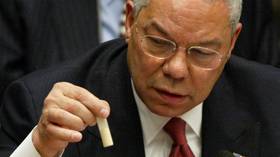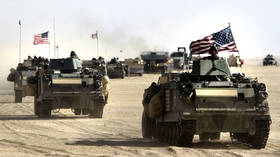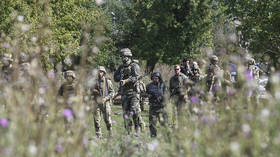Colin Powell’s anthrax vial taught the US a valuable lesson – that it can get away with any lie it wants
It’s been 20 years since the Secretary of State made his UN Security Council address, fake anthrax vial in hand, which led to the Iraq war and millions of deaths

Twenty years ago, former Secretary of State Colin Powell delivered his now-infamous address before the United Nations Security Council, making the case for war against Iraq.
The presentation would later be revealed as lies. Sadly, it would also turn out that no one seemed to care.On February 5, 2003, I watched it all with a sense of boiling anger. The day before, I had made the following prediction to Japanese media:
“He’s [Powell] going to present circumstantial evidence that packaged together and presented will make a compelling case that [UN weapons] inspections don’t work, inspections can’t work, that Iraq is actively conspiring against inspections, thereby, denigrating the efficacy of inspections, while the world waits for inspectors to do their job. The purpose of Colin Powell’s presentation tomorrow is to destroy international trust and confidence in weapons inspections and that is a darn shame.”
I was 100% correct in my assessment.
I was in Japan at the invitation of Japanese activists to generate political opposition to America’s looming war on Iraq. I addressed the Japanese parliament and spoke with several major Japanese media outlets. Shortly after Powell finished speaking, I gave an interview with Kyodo News, where I dismissed Powell’s assertions that Iraq was hiding weapons of mass destruction as “unsubstantiated.”
“There’s nothing here that’s conclusive proof that Iraq has weapons of mass destruction,” I told Kyodo News. “Everything in here is circumstantial, everything in here mirrors the kind of allegations the US has made in the past in regard to Iraq’s weapons program,” I said. “He just hits you, hits you, hits you with circumstantial evidence, and he confuses people – and he lied, he lied to people, he misled people.”
Powell’s iconic moment was when he raised a vial of white powder – a proxy intended to simulate dry powder anthrax, a potent biological weapons agent, in an effort to link Iraq with the terrorist attacks in the US in October 2001 where dry powder anthrax was sent through the US postal system in envelopes. Ironically, the anthrax in question was actually produced by the US. Iraq is only known to have produced liquid bulk anthrax, which has a shelf life of only three years, and the last known batch of liquid bulk anthrax was produced in 1991 at a state-owned factory which was destroyed in 1996.
“Colin Powell holds up a vial of dry powder anthrax and he makes allusions to the attack in the United States through the letters. That was US government anthrax! It had nothing to do with Iraq,” I said. Powell, I explained, was engaging in “classic bait-and-switch” in his presentation. “Iraq, anthrax, vial, dry powder – what connection do they have? None!”
During my February 4 media event in Japan, I made the following prediction about the consequences of Powell’s UN presentation:
“The United States will seek to compel the Security Council into passing a new resolution, if the Security Council fails to do so the United States will go it alone with its narrow coalition and I see a massive aerial bombardment beginning by the end of February, I see ground troops in significant numbers crossing over into Iraq by early March, and I don’t see this war finishing anytime soon. While we may occupy Baghdad sometime in June, we’ll be occupying Iraq for months, if not years. It will be an occupation that will be carried out with the violent opposition of the Iraqi people, and I see an increase in the acts of anti-American terror abroad. I think an American invasion of Iraq is the best recruitment poster that Osama bin Laden and Al-Qaeda will ever have.”
I challenged Powell’s assertions until I was blue in the face, including at a public forum held at the University of Tokyo the day after Powell spoke, February 6.
It was to no avail.
“There can be no doubt that Saddam Hussein has biological weapons and the capability to rapidly produce more, many more,” Powell told the Security Council, “and he has the ability to dispense these lethal poisons and diseases in ways that can cause massive death and destruction.”
All lies. But the US mainstream media repeated his words as gospel, and the American people ate it up as if it were Manna from heaven. My country went to war based upon a foundation of lies told by someone who, up until that moment, was seen as one of the most credible individuals in American public service ever.
The Powell presentation set a precedent of public lies which haunts the US and the world to this day. The United States, it seems, is incapable of telling the truth about anything, especially when it deals with national security and foreign policy.
The current manifestation of this precedent is playing out before the world when it comes to the Russia-Ukraine conflict. As was the case with Iraq and Anthrax, the US leads a coalition of compliant partners in spreading similar lies about Russia, whether to ignore history when labeling the Russian decision to intervene an “unprovoked act of aggression”, backing the Ukrainian version of the Bucha massacre, or misleading the Ukrainians and the world about the ability of US-led injections of military equipment to change the tide of battle against Russia – it won’t.
It is virtually impossible for Russia to even begin to contemplate negotiations when the party sitting at the other side of the table, the United States, incorporates lies into every aspect of its argument. The Powell Precedent is pure poison, and the world, especially Russia, would be foolish to accept any drink from a chalice offered by the United States.
Colin Powell may no longer be with us, but his legacy lives on in the bodyguard of lies he helped build around everything the US has said and done since that fateful day 20 years ago.
The statements, views and opinions expressed in this column are solely those of the author and do not necessarily represent those of RT.
https://www.rt.com/russia/571060-day-of-russian-science/





0 Comments:
Post a Comment
Subscribe to Post Comments [Atom]
<< Home